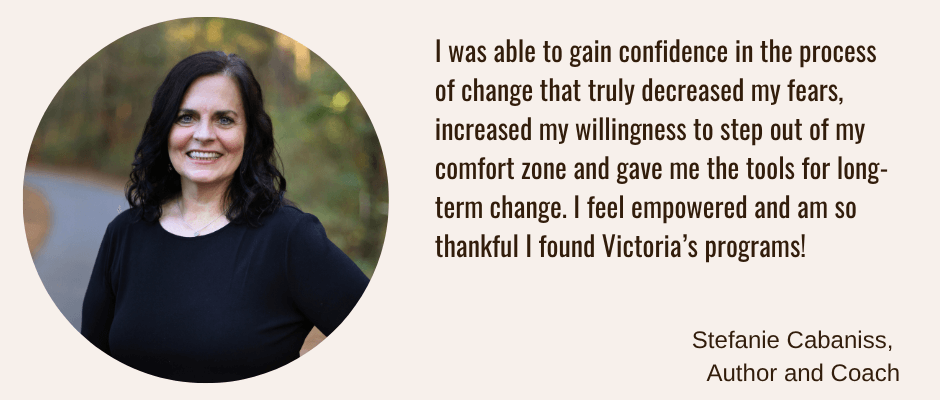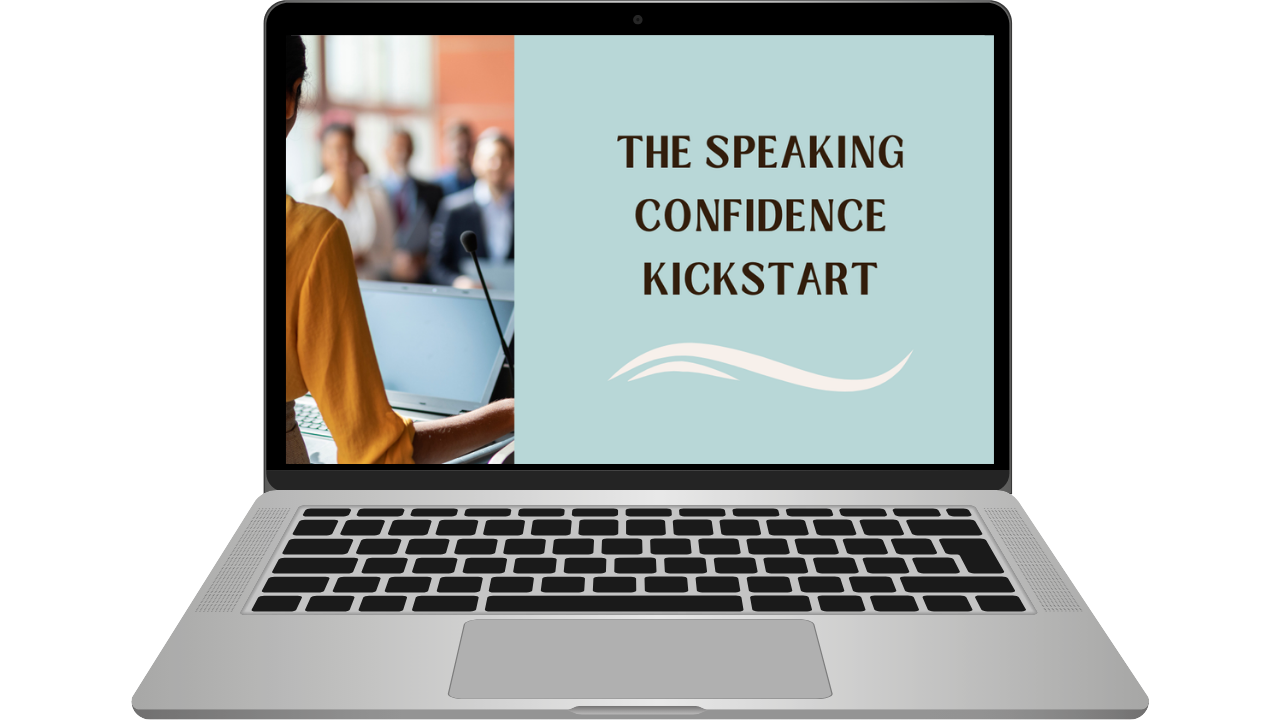What to Do When Your Mind Goes Blank During a Presentation (And How to Recover Without Losing Your Confidence)
By Victoria Lioznyansky, M.S., M.A.
Let’s be honest: few moments are more terrifying than standing in front of an audience and suddenly… nothing.
Your mind goes completely blank. You forget what you were going to say next. Panic sets in. And every second of silence feels like a lifetime.
If this has happened to you (or even if it’s your worst-case scenario fear), you’re far from alone. I’ve worked with hundreds of brilliant professionals, and I can tell you: even the most accomplished experts experience this kind of mental freeze.
The good news?
You can bounce back from a blank mind. Even better, you can train yourself to stay calm and collected when it happens.
Let’s talk about exactly how.

Why Your Brain Goes Blank When You’re Speaking
First, let’s clear something up: forgetting what to say during a presentation has nothing to do with intelligence or preparation. It has everything to do with how your brain responds to perceived danger.
When you step into the spotlight (whether that’s in a meeting, on Zoom, or on stage), your brain often triggers a stress response.
Your nervous system senses judgment. It senses visibility. It senses pressure.
And as a result, it does what it’s wired to do: it protects you.
It pulls energy away from your prefrontal cortex (the part responsible for memory and reasoning) and routes it toward survival mode.
Your heart races. Your mouth goes dry. And your thoughts? They vanish.
But here’s the important part: once you understand what’s happening, you can stop blaming yourself and start doing something about it.
Real-Life Example: From Freeze to Flow
One of my clients, a brilliant marketing executive, shared a moment that had haunted her for years. She was presenting at a company-wide meeting when, mid-sentence, her mind just… stopped. She couldn’t remember what came next. Everyone stared.
She panicked, apologized, and rushed through the rest of her presentation, visibly flustered. Afterward, she couldn’t stop replaying it in her mind. It made her avoid every high-stakes speaking opportunity for three years.
When we started working together, we didn’t just fix the fear. We rewired it. She learned how to refocus, how to lead the energy in the room, and how to shift from internal panic to external presence.
The next time her mind blanked (yes, it still happened!), she paused, smiled, made a quick joke, and picked up right where she left off. She received a standing ovation, not despite the moment, but because of how gracefully she handled it.
That’s the power of owning your presence, even when things don’t go perfectly. (Read more real-life stories)
FREE GUIDE
We never spam or share your data. You may unsubscribe from these communications at any time.
What to Do When Your Mind Goes Blank in the Moment
You’re in the middle of presenting. Your thoughts disappear. What now?
Here are five ways to recover gracefully and keep your audience engaged without spiraling into panic:
✅ 1. Pause and Breathe
Take a calm, slow breath. Most speakers rush to fill the silence because they’re afraid their audience will interpret the pause as a mistake or a fault. The opposite is actually true. A pause makes you look more confident and in control. Your audience will most likely assume there's meaning behind the silence and may even interpret it as intentional.
They’ll lean in, curious about what’s coming next, giving you both space and power.
✅ 2. Say Something Conversational
Try a grounding phrase like: “Let me take a second to reframe that…” or “Let’s come back to this. There’s something important I want to say.”
This buys you a moment to recalibrate without drawing attention to the blank.
✅ 3. Glance at Your Notes
If you’re working from bullet points or an outline, refer to them briefly. Your audience won’t judge you. They’ll appreciate that you’ve prepared.
✅ 4. Ask the Audience a Quick Question
Something like, “By the way, how many of you have experienced this in your own teams?”
It re-engages them, gives you a breather, and creates connection.
✅ 5. Most Importantly… Don’t Apologize
You don’t need to say “I’m sorry, I forgot.”
Own the moment. Keep going. The audience is far less focused on your slip than you think.
✅ 6. If All Else Fails, Ask Your Audience to Help You Find Your Spot
Let’s say you’ve tried everything—pausing, reframing, checking your notes—and you still can’t get back on track. Here’s a powerful fallback:
Turn to your audience with a smile and say something like, “Remind me where we were? I want to make sure I pick back up in the right spot.”
This does two things:
- It breaks the tension—and often gets a warm laugh or encouraging response.
- It re-establishes connection—your audience feels like they’re part of the moment, not just passive observers.
You’re not giving up. You’re showing that you’re human, and you care enough about your message to get it right. That’s leadership in action.
What Not to Do When You Blank Out
Here’s what tends to increase anxiety and disconnection when your mind goes blank:
🚫 Don’t freeze and say nothing. The silence will feel louder and longer than it is, but without action, panic builds.
🚫 Don’t apologize excessively. It makes the moment feel more dramatic than it is and can shift audience focus onto your mistake.
🚫 Don’t start over. Picking up from where you left off is almost always more effective than rewinding.
How to Prevent Mental Blanks Long-Term
Recovering from a blank is a skill. But preventing them altogether?
That’s where real transformation happens, and it starts from within.
Here’s what I teach my clients when they want to go from nervous to unshakable:
✔️ Shift the Focus Away From Yourself
I recorded a podcast episode on this. Instead of asking, “What do they think of me?” train your brain to ask, “How do I want them to feel?”
This simple reframe is a game-changer. It pulls you out of fear and into service.
✔️ Ditch the Full Script
Memorization creates pressure. If one word goes missing, your brain panics.
Instead, structure your talk around anchor points so you can stay fluid and speak naturally.
✔️ Rehearse Under Real-World Conditions
Practice standing up. Practice aloud. Practice while walking. Simulate mild stress so your brain gets used to functioning under pressure.
✔️ Build Unshakable Confidence from Within
The biggest difference between a nervous speaker and a powerful one?
It’s not performance. It’s internal safety. When you feel safe to be seen and heard, your message flows with ease.
And yes, this can be taught.
Mini FAQ: Fast Answers to Common Fears
Q: What if I go blank during a Zoom presentation?
Treat it the same way. Pause, breathe, and use conversational cues. Engage your audience with a quick question to buy time and rebuild flow.
Q: Should I memorize my whole speech to avoid blanking?
Nope! It’s more effective to use bullet points and key phrases. Memorization can backfire and increase pressure. Again, this is something I effectively teach in my programs.
Q: Is it normal to feel anxious even after years of public speaking?
Absolutely. But with the right strategies, you can learn to manage that anxiety so it doesn’t take over the moment.

The Bottom Line
Going blank during a presentation doesn’t mean you’re not a good speaker. In fact, how you recover from that moment can actually deepen the trust and connection with your audience.
But the best outcome?
Learning how to speak confidently without fear, without faking, and without your brain short-circuiting under pressure.
That’s exactly what I teach inside my Brilliant Speakers Academy®.
If you're ready to stop dreading the spotlight and start showing up as the expert and leader you already are, this is your next step.
Want personalized support to finally conquer your fear of public speaking?
Let’s talk. I’d love to hear your story and help you map out a clear path to speaking with unshakable confidence.
Click here to schedule your free strategy call with me.
You don’t have to wing it. You just need the right tools, the right strategy, and a new way to think.

About Victoria Lioznyansky, M.S., M.A.
Victoria has helped hundreds of executives, professionals, and entrepreneurs overcome their fear of public speaking, transforming them into confident, assertive, and captivating speakers. Having once been a very nervous speaker herself, Victoria is now a sought-after public speaker and the founder of Brilliant Speakers Academy®, an online public speaking coaching program. She also hosts the Confidence Within podcast.

FREE MINI-COURSE: The Speaking Confidence Kickstart
Learn the first real step to speaking with calm, clarity, and confidence, even if public speaking fills you with anxiety.
GRAB THE FREE TRAINING
